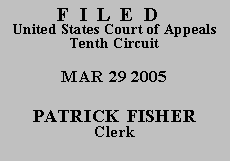

| PATRICK D. COANDO,
Plaintiff-Appellant, |
|
| v. | |
| A. LYNN PAYNE, in his individual
capacity and as Duchesne County District
Judge,
Defendant-Appellee. |
|
On August 9, 2004, Coando, a Wyoming resident, filed a complaint in the District of Wyoming naming as the sole defendant A. Lynn Payne, a Utah state judge. Coando's complaint alleged that Payne had presided over several Utah state criminal proceedings in which Coando was a defendant and had, in the course of those proceedings, violated Coando's constitutional rights in various ways. Payne moved to dismiss or transfer Coando's complaint, arguing that the court lacked personal jurisdiction over him and, in the alternative, that venue was improper in the District of Wyoming. On September 30, 2004, the district court granted Payne's motion and dismissed Coando's complaint without prejudice. In doing so, the district court concluded that venue was not proper in the District of Wyoming, and thus declined to determine whether it had personal jurisdiction over Payne.
Coando now appeals the district court's order of dismissal. A "district court's determination of where [an] action may be brought involves an interpretation of the venue statute and is, therefore, a question of law subject to de novo review." Pierce v. Shorty Small's of Branson Inc., 137 F.3d 1190, 1191 (10th Cir. 1998). A district court's decision whether to dismiss a case for improper venue or whether, instead, to transfer to a proper venue is reviewed for abuse of discretion. Id.
A review of Coando's complaint clearly indicates that it "is not founded solely on diversity of citizenship . . . ." 28 U.S.C. § 1391(b). To the contrary, it alleges numerous violations of Coando's constitutional rights and cites, in pertinent part, 42 U.S.C. § 1983 as a basis for jurisdiction. Thus, under the general venue statute, it may "be brought only in (1) a judicial district where any defendant resides, if all defendants reside in the same State, (2) a judicial district in which a substantial part of the events or omissions giving rise to the claim occurred, . . . or (3) a judicial district in which any defendant may be found, if there is no district in which the action may otherwise be brought." 28 U.S.C. § 1391(b).
We agree with the district court that the District of Wyoming fails to meet any of these three potential bases for venue. First, it is apparent from the record that Payne does not reside in Wyoming. To the contrary, Coando's complaint alleges that Payne is a Utah resident. Second, a review of Coando's complaint clearly establishes that all of the alleged events giving rise to his claims occurred in Utah. Third, there is no indication in the record that Payne "may be found" in the District of Wyoming, and the record clearly establishes that venue for Coando's complaint is proper in Utah. Thus, venue was improper in the District of Wyoming.
Finally, although Coando challenges the district court's decision to dismiss his case without prejudice rather than transfer it, we find no abuse of discretion on the part of the district court in this regard.
AFFIRMED.
Entered for the Court
Mary Beck Briscoe
Circuit Judge
*.This order and judgment is not binding precedent, except under the doctrines of law of the case, res judicata, and collateral estoppel. The court generally disfavors the citation of orders and judgments; nevertheless, an order and judgment may be cited under the terms and conditions of 10th Cir. R. 36.3.
2.After examining the briefs and appellate record, this panel has determined unanimously that oral argument would not materially assist the determination of this appeal. See Fed. R. App. P. 34(a)(2); 10th Cir. R. 34.1(G). The case is therefore ordered submitted without oral argument.